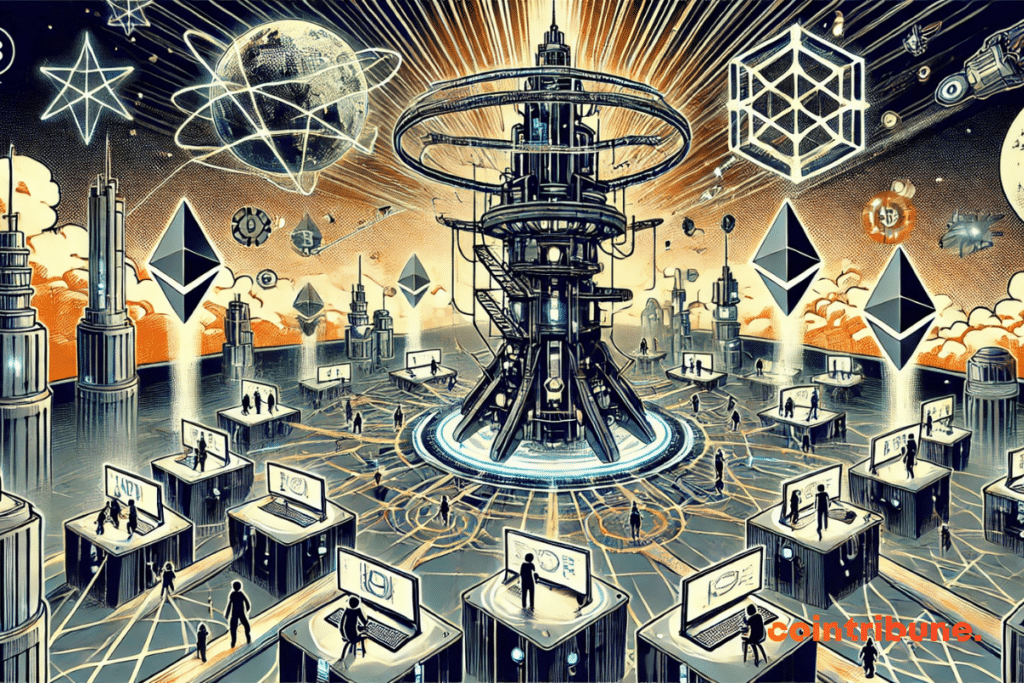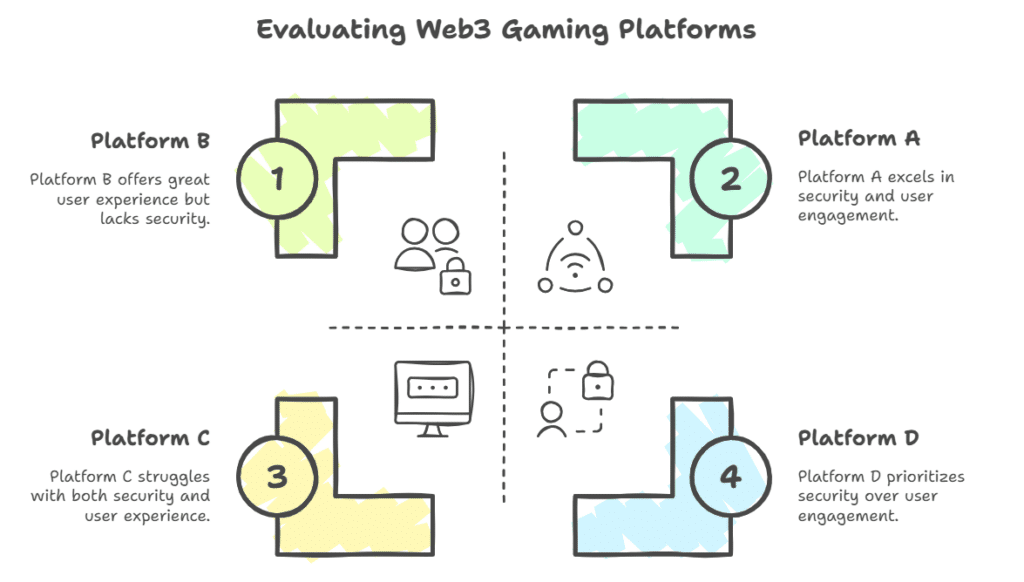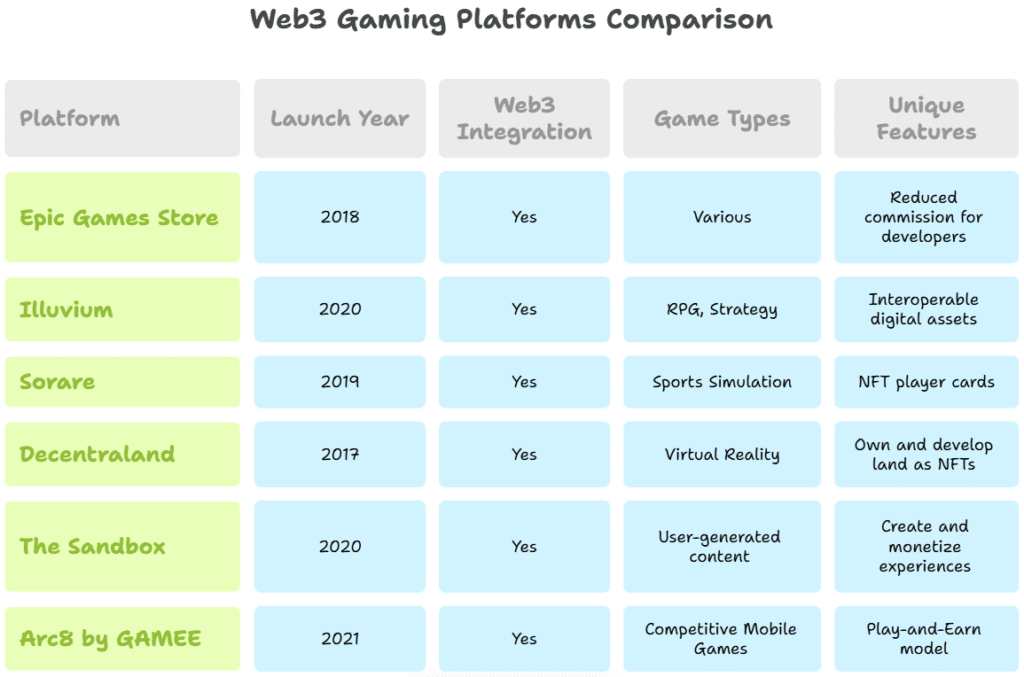Top Platforms to Play Web3 Games
Web3 marks a new era for the video game industry. It is based on blockchain, decentralization, and digital ownership. This model transforms the way players interact with games and own their assets. The rise of Web3 games has led to the creation of dedicated platforms, allowing access to these new experiences. Some prioritize exploration and creation, while others focus on competition and strategy. This article presents the best Web3 gaming platforms, their specifics, their advantages, and the challenges they must face.

In brief
- Definition: Web3 gaming platforms allow players to access decentralized games integrating blockchain, NFTs, and tokens.
- Technology: they rely on infrastructures like Ethereum, Polygon, or Immutable X, ensuring digital ownership and transparency.
- Importance: they provide players with true autonomy, economic opportunities, and interoperable immersive experiences.
- Security: they ensure asset traceability, protect against fraud, and allow free management of digital items.
- Challenges: technical complexity, token volatility, slow adoption by studios, and still vague regulation.
Web3 and its influence on gaming
Web3 represents a new generation of internet based on decentralization. It relies on blockchain, which guarantees the transparency of transactions and the ownership of digital assets. Unlike Web2, dominated by centralized platforms, Web3 allows users to control their data and assets.
In the video game industry, this technology reinvents economic models. Players can truly own their in-game items in the form of NFTs, exchange them freely, and generate income through Play-and-Earn mechanisms. Web3 games also promote interoperability, allowing the use of the same assets across multiple platforms.
This transformation redefines player engagement. The experience is no longer limited to simple entertainment; it incorporates an economic and social dimension, making games more immersive and interactive.
Criteria for selecting Web3 gaming platforms
Not all Web3 gaming platforms are equal. Several criteria help evaluate their quality and relevance for players. These elements ensure an optimal experience and enhanced security.

Security and reliability
Players must protect their digital assets against hacks and scams. A secure platform uses robust protocols, such as multi-factor authentication and audited smart contracts. Wallet protection and transaction transparency also bolster user trust.
Variety and quality of the games offered
A good platform offers a diverse catalog, featuring strategy games, RPGs, simulations, and sports. The quality of gameplay, the depth of mechanics, and technological innovation also influence player interest.
User experience
The interface should remain smooth and intuitive. Players should easily navigate between menus, manage their assets without complexity, and access effective customer support. An accessible platform attracts a broader audience, including those discovering Web3.
The ecosystem and community
A dynamic platform relies on an engaged community. A rich ecosystem encourages interaction between players, the creation of internal markets, and the development of new content. User participation also ensures a constant evolution of the platform.
The main platforms for playing Web3 games
Web3 games require specialized platforms to function optimally. These platforms integrate blockchain technologies, guarantee ownership of digital assets, and allow secure transactions. They provide players access to a wide range of decentralized games, from role-playing games to sports simulations and virtual worlds.

Epic Games Store
Launched in 2018, the Epic Games Store quickly became a major competitor to Steam. Epic Games, known for the success of Fortnite, designed a platform attracting many developers with a reduced commission policy. This approach has encouraged the adoption of independent studios and large video game companies.
The integration of Web3
Epic Games Store began integrating Web3 in 2022, becoming the first major game distribution platform to accept NFTs and blockchain. Unlike Steam, which banned NFT-based games, Epic Games has adopted a more open approach to encourage innovation.
Available Web3 games
The game Grit, a battle royale themed around the Wild West, is one of the first Web3 games available on the platform. It incorporates unique NFTs that offer players skins, mounts, and customizable items.
Illuvium
Illuvium is a blockchain gaming platform developed on Ethereum. Founded in 2020, it specializes in open-world role-playing games and strategy games. Its ecosystem is based on an interoperable model, allowing players to use digital assets across different games linked to the platform.
The games offered are:
- Illuvium Arena: a tactical combat game where players face off against creatures called Illuvials;
- Illuvium Overworld: an open-world RPG that offers exploration of diverse landscapes and the capture of Illuvials;
- Illuvium Zero: a resource management game that allows players to build infrastructure and manage virtual lands.
Illuvium collaborates with influential companies and brands, including Team Liquid and GameStop, to enhance player engagement and expand its ecosystem.
Sorare
Sorare is a sports simulation game that relies on the Ethereum blockchain. Since its launch in 2019, it has established itself as a reference in NFT games by offering player cards in the form of NFTs.
Players buy, collect, and trade digital player cards. Each card represents a real football player and has a unique value based on the player’s performance in official competitions.
Initially focused on football, Sorare has expanded to baseball and basketball, attracting an even broader audience. Partnerships with the NBA, MLB, and European leagues strengthen its position in the world of Web3 games.
Decentraland
Decentraland is a decentralized virtual reality platform operating on the Ethereum blockchain. Its launch marked a revolution in the concept of virtual worlds by allowing players to own and develop plots of land in the form of NFTs.
In Decentraland, players can:
- Buy digital land in the form of NFTs;
- Create and customize buildings, events, and immersive experiences;
- Interact with other users and participate in a decentralized virtual economy.
The platform uses the MANA token as a medium of exchange. Players use it to buy items, plots, and services in the Decentraland ecosystem.
The Sandbox
The Sandbox is a decentralized gaming platform that allows players to create, own, and monetize their experiences using blockchain technology. The project is based on the Ethereum blockchain and offers a creativity and community-centered approach.
The features of The Sandbox include:
- Content creation: players have intuitive tools to design their own games and digital assets in the form of NFTs;
- Monetization: the platform allows buying, selling, and trading NFTs on an internal marketplace.
The Sandbox collaborates with famous brands and artists, thus enhancing its appeal and attracting an active community that participates in the constant expansion of the platform.
Arc8 by GAMEE
Arc8 is a competitive mobile gaming platform leveraging blockchain technology. Developed by GAMEE, a subsidiary of Animoca Brands, it aims to combine e-sports and Web3 by offering a Play-and-Earn experience. Players can:
- Participate in tournaments and challenge other players to earn GMEE tokens;
- Exchange their winnings on platforms compatible with the GAMEE blockchain;
- Access premium features through accumulated tokens.
Arc8 stands out for:
- A smooth and intuitive user interface;
- A variety of games, suitable for different player profiles;
- Mobile accessibility, which facilitates the integration of a broader audience into the world of Web3 games.
Web3 platforms are revolutionizing the video game industry by allowing the ownership of digital assets, secure exchange of in-game items, and new economic models. Some platforms, like Epic Games Store, facilitate the transition from traditional gaming to Web3, while others, like Decentraland and The Sandbox, offer immersive and decentralized experiences.
The advantages and challenges of Web3 gaming platforms
Web3 platforms are transforming the gaming universe by introducing new economic models and decentralized mechanisms. They offer significant advantages to players and developers, but also encounter challenges to overcome in order to promote broader adoption.

The advantages
Players truly own their digital assets, whether it is skins, characters, virtual lands, or game cards. Unlike traditional games where items remain tied to the publishers’ servers, blockchain guarantees independent ownership. Players can trade, sell, or transfer their assets without restrictions.
Transparency and security
The blockchain ensures complete traceability of transactions and enhances the security of digital assets. Purchases, sales, and exchanges of in-game items are recorded immutably, thus reducing the risk of fraud, hacking, and counterfeiting.
New economic models
Web3 games introduce mechanisms such as Play-to-Earn (P2E) and Play-and-Earn (P&E). These systems allow players to earn tokens by completing quests, participating in competitions, or selling digital items. This monetization attracts a new category of players and paves the way for a more participative and inclusive virtual economy.
The challenges
The use of Web3 games requires a minimal understanding of digital wallets, NFTs, and smart contracts. Many players unfamiliar with blockchain struggle to manage decentralized transactions and secure their private keys. The user interface of some platforms remains poorly intuitive, limiting access for newcomers.
Volatility of cryptocurrencies
The value of tokens used in Web3 games varies according to the cryptocurrency market. This instability can impact the game’s economy, making players’ earnings unpredictable. When a game loses popularity, the value of its tokens can plummet, leading to financial losses for those who invested in the ecosystem.
Uncertain regulation
Governments and financial institutions are seeking to define clear rules to regulate Web3 games. Some countries already restrict the use of NFTs and cryptocurrencies, limiting access to certain platforms. The lack of standardized regulation poses issues in terms of player protection and management of digital assets.
User experience
Interactions with Web3 platforms remain complex for a large number of players. The integration of digital wallets, purchasing tokens, and managing transactions require some familiarity with blockchain. Developers must improve the ergonomics and fluidity of platforms to simplify their adoption.
Adoption by major studios
Many major studios hesitate to fully integrate Web3 due to controversies surrounding NFTs and the resistance from a part of the gaming community. Some players still perceive NFTs as just an additional monetization strategy, which hinders their widespread adoption. Studios must find a balance between sustainable economic models and engaging gaming experiences.
Web3 gaming platforms are gradually transforming the video game industry. Thanks to technologies like blockchain, they offer players more freedom, ownership, and security in their gaming experiences. Platforms like Epic Games Store, The Sandbox, Decentraland, or Sorare show that Web3 games are no longer limited to initial prototypes based on Play-to-Earn. The focus is now on the gaming experience, with a smoother integration of digital assets. However, challenges remain. The volatility of cryptocurrencies, scalability issues, and the still limited adoption by traditional studios slow down the development of Web3 gaming. Nevertheless, technological improvements and the growing interest from companies suggest a promising future for these platforms.
As solutions improve and regulation becomes clearer, Web3 games could become the new standard in the video game universe.
FAQ
Transaction fees, known as “gas fees,” are used to compensate blockchain network validators. Some games adopt alternative blockchains or Layer 2 solutions to reduce these costs and improve accessibility.
Yes, some platforms offer access to Web3 games for free or through Free-to-Play options. However, to fully engage with the game’s economy, such as making purchases or trading NFTs, a digital wallet and tokens are often required.
Role-playing games (RPGs), virtual worlds (metaverses), and sports simulations currently dominate the Web3 market. Titles like Decentraland, Sorare, and Illuvium showcase this trend with immersive experiences and tradable digital assets.
Maximize your Cointribune experience with our "Read to Earn" program! For every article you read, earn points and access exclusive rewards. Sign up now and start earning benefits.
Diplômé de Sciences Po Toulouse et titulaire d'une certification consultant blockchain délivrée par Alyra, j'ai rejoint l'aventure Cointribune en 2019. Convaincu du potentiel de la blockchain pour transformer de nombreux secteurs de l'économie, j'ai pris l'engagement de sensibiliser et d'informer le grand public sur cet écosystème en constante évolution. Mon objectif est de permettre à chacun de mieux comprendre la blockchain et de saisir les opportunités qu'elle offre. Je m'efforce chaque jour de fournir une analyse objective de l'actualité, de décrypter les tendances du marché, de relayer les dernières innovations technologiques et de mettre en perspective les enjeux économiques et sociétaux de cette révolution en marche.
The views, thoughts, and opinions expressed in this article belong solely to the author, and should not be taken as investment advice. Do your own research before taking any investment decisions.